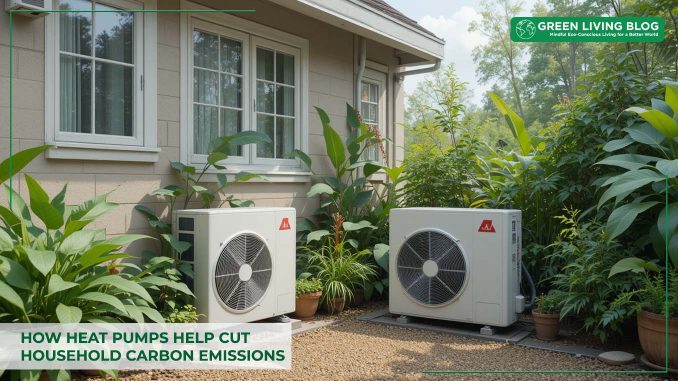
In the face of climate change, many homeowners are looking for ways to lower their carbon footprint. One effective solution is installing a heat pump.
Heat pumps provide an eco-friendly alternative to traditional heating methods and can significantly reduce household carbon emissions.
Continue reading to discover how heat pumps work, their benefits, and why they’re an essential step towards a greener future.
What Is a Heat Pump?

A heat pump is a device that moves heat from one place to another. It works by extracting heat from the air or ground outside your home and transferring it inside to provide heating. In warmer months, the process can be reversed to provide cooling. Unlike traditional boilers, which burn fossil fuels to produce heat, heat pumps use electricity to move heat, making them far more energy efficient.
Is a Heat Pump Right for Your Home?
While heat pumps are a great solution for reducing carbon emissions, they may not be suitable for every home. The efficiency of a heat pump depends on the type of property and its insulation.
Homes with poor insulation or those in very cold climates may not benefit as much. In these cases, the system may struggle to maintain consistent temperatures, leading to higher energy consumption.
Consulting with a professional installer, like iHeat, can help determine whether a heat pump is a good fit for your home and whether any additional measures, such as improved insulation, are needed.
How Heat Pumps Reduce Carbon Emissions

As the world moves towards a more sustainable future, reducing carbon emissions has become a priority for many homeowners. One of the most effective ways to achieve this is by switching to a heat pump.
Unlike traditional heating systems that rely on burning fossil fuels, heat pumps use electricity to transfer heat from the outside air or ground into your home. This highly efficient process not only helps lower energy consumption but also significantly reduces the carbon emissions associated with heating.
In this section, we’ll explore the various ways heat pumps contribute to a greener, more sustainable future for your home.
1. Energy Efficiency
Heat pumps are incredibly efficient because they don’t generate heat by burning fuel. Instead, they move heat that already exists in the air or ground. This means for every unit of electricity they use, they can generate multiple units of heat.
As a result, they require significantly less energy to provide the same level of warmth, reducing overall household energy consumption. This high efficiency reduces the amount of energy needed for heating, leading to lower carbon emissions and contributing to a more sustainable home environment.
2. Reduced Reliance on Fossil Fuels
Since heat pumps don’t burn fossil fuels like gas or oil, they significantly reduce a home’s carbon footprint. By using renewable electricity or green energy sources, the carbon emissions associated with heating a home are minimised.
This makes them a powerful tool in the fight against climate change. As the UK’s grid continues to shift towards renewable energy, the environmental benefits of heat pumps will increase, making them an even more sustainable option for homeowners.
3. Long-Term Savings and Sustainability
While the initial cost of installing a heat pump might be higher than traditional heating systems, they offer long-term savings. Over time, you’ll spend less on energy bills, and the system’s efficiency helps further reduce your household’s carbon emissions.
In addition, heat pumps can increase the value of your property due to their eco-friendly benefits. A well-maintained heat pump can last for many years, making it a sustainable choice that continues to save you money in the long run.
Benefits of Heat Pumps Beyond Emission Reduction
Heat pumps offer several advantages beyond reducing carbon emissions, including:
- Consistent Comfort: Heat pumps provide consistent indoor temperatures throughout the year, without the fluctuations associated with traditional heating methods.
- Low Maintenance: Compared to boilers, heat pumps require less maintenance, reducing the time and money spent on repairs and servicing.
- Government Incentives: The UK government offers incentives and grants for households that install heat pumps, making the switch to sustainable heating more affordable.
The Future of Sustainable Heating
As the world looks for ways to cut carbon emissions and combat climate change, heat pumps are becoming an increasingly popular option for homeowners. With rising energy prices and growing environmental concerns, investing in a heat pump can offer both financial and ecological benefits.
Making the switch to a heat pump is an excellent way to reduce your carbon emissions and contribute to a greener future. If you’re ready to take the next step towards sustainable heating, explore your options and consider a heat pump installation today.
![]()
Author Profile

- Eco Warrior by day, Eco Blogger by night trying to get the eco balance right.
Latest entries
 Green GuidesNovember 3, 2025The Beginner’s Guide to Making Your Own Nontoxic Candles at Home
Green GuidesNovember 3, 2025The Beginner’s Guide to Making Your Own Nontoxic Candles at Home Green Home GuidesOctober 14, 2025What are Eco-Friendly Tissue Options for Modern UK Homes?
Green Home GuidesOctober 14, 2025What are Eco-Friendly Tissue Options for Modern UK Homes? Best practicesSeptember 17, 20253 Ways Young Families Can Commit to Sustainable Living
Best practicesSeptember 17, 20253 Ways Young Families Can Commit to Sustainable Living EnvironmentSeptember 9, 2025Eco-friendly Gardening on a Budget: 6 Sustainable Choices that make a Difference
EnvironmentSeptember 9, 2025Eco-friendly Gardening on a Budget: 6 Sustainable Choices that make a Difference





Leave a Reply
You must be logged in to post a comment.